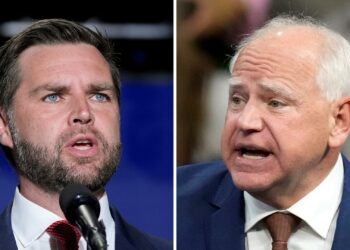Executives say the deal’s failure would also raise “serious questions” about whether the company remains at its longtime headquarters in Pittsburgh.
In Japan, where the winner of the governing Liberal Democratic Party’s leadership race this month will become the next prime minister, Biden’s plans to block the acquisition have been portrayed in the media as “insupportable and an insult to a close ally,” Kingston said.
Shigeru Ishiba, a former defense minister who is a front-runner in the LDP leadership race, told Reuters last week that what the U.S. was saying about Nippon Steel was “very unsettling” and “could undermine the trust of its allies.”
Another candidate, Digital Minister Taro Kono, said that he “never imagined” the takeover would raise national security concerns and that he would raise the issue with the White House should he become prime minister.
Rahm Emanuel, the U.S. ambassador to Japan, has said the countries’ relationship is “deeper, richer and stronger than any single commercial transaction.”
A failure to acquire U.S. Steel would be a harsh blow to expansion plans at Nippon Steel, Japan’s largest steelmaker, which is focusing on investment in the U.S. and India after having withdrawn from a joint venture in China that lasted almost 50 years.
The Japan Business Federation, the country’s largest business group, said companies were watching the U.S. review process with keen interest, especially those thinking about investing in the U.S.
“I strongly hope that this issue is not influenced by the U.S. presidential election and that it’s handled based on a fair and just due process,” the group’s chairman, Masakazu Tokura, told reporters in Tokyo on Monday.
The Japanese government’s top spokesperson declined last week to comment on reports that Biden would block the deal, “as it concerns the management of an individual company.”
But the spokesperson, Yoshimasa Hayashi, added that expanding mutual investment between the U.S. and Japan and cooperating on economic security issues “are indispensable for both sides.”
Long Le, an associate teaching professor at Santa Clara University’s Leavey School of Business, said Biden’s opposition to the deal indicated an important shift in U.S. politics when it comes to international trade, foreign direct investment and the extent to which the U.S. government is involved in industry.
The Committee on Foreign Investment in the United States, an arm of the U.S. Treasury that reviews the national security implications of foreign acquisitions of U.S. businesses, has never blocked a Japanese acquisition, Le said.
Biden is “still defining what is national security,” he said in a phone interview. “And through this particular case, he is defining clearer than ever before that no foreign acquisition can be bought from a sector that’s considered critical, even if it’s from a country that is an ally of the United States.”
Kingston said the hope in Japan was that this was not the last word on the deal.
“Maybe Japan Inc. is hoping that once the dust clears after the election, sense will prevail,” he said.
Arata Yamamoto reported from Tokyo and Jennifer Jett from Hong Kong.
Source link : http://www.bing.com/news/apiclick.aspx?ref=FexRss&aid=&tid=66e24ba03f344be6b3132ab2fed585da&url=https%3A%2F%2Fwww.nbcnews.com%2Fnews%2Fworld%2Fbiden-blocking-us-steel-takeover-japan-nippon-steel-china-rcna170350&c=4151527233213592681&mkt=en-us
Author :
Publish date : 2024-09-11 14:20:00
Copyright for syndicated content belongs to the linked Source.







